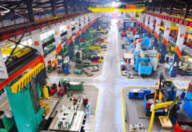UK Manufacturing Growth in 2017
PallMallDuring the last few months, the UK has seen a surge in industrial production growth, with rises of double the rates that were predicted. This is largely due to the manufacturing sector performing ahead of expectations, and at Pall Mall Estates we have noticed a knock-on effect as demand for factory premises also increased.
In this article, we discuss the reasons behind the manufacturing revival, and how it may affect the commercial property market.
Brexit Effects
Although it may surprise some people, the weak pound caused by the Brexit decision has made British made products more attractive and affordable to overseas buyers - November was the best month for UK manufacturers since 2013, with many factory owners reporting high demand for their goods.
The outlook also looks to be encouraging, with manufacturing predicted to out-perform the UK economy as interest for exports continues to grow. While it is often perceived to be a struggling industrial sector, manufacturing actually employs 2.7 million people, and the UK is currently the ninth largest industrial nation in the world.
Manufacturing Stars
The motor vehicle industry is leading the growth in industrial production - 2016 saw product sales increase by £6.2 billion to £54.8 billion. Furniture manufacture and exports of mining products also helped support the impressive figures.
In addition, the UK textile and clothing industry has seen production levels increase by 28% since 2012, and is proving to be a growing success story, with 127,500 people employed by over 340 textile manufacturing companies.
A significant amount of investment and attention is also being paid to the clean energy sector, with Britain becoming a major player in the development of new technologies. In a recent example of this, the Government announced the location of the £80 million National Battery Centre in the West Midlands.
Property Demand
As industrial exports grow, so does the need for suitable business premises by manufacturing companies, which has the potential to cause a property shortage in coming years.
Due to the rise in online shopping, warehouses which were once only suited to industrial businesses are now also in-demand from e-commerce retailers, requiring storage space for their products. This is illustrated by Amazon accounting for 20% of all warehouse leases in 2017.
Therefore, to ensure they have adequate room for growth, savvy manufacturers should be looking to negotiate for warehouse and factory premises while costs and availability remain at a good level.
At Pall Mall Estates, we are ideally positioned to help businesses locate quality manufacturing properties. We have a significant portfolio including large warehouses in Birmingham, the West Midlands, and Staffordshire.
— Pall Mall Estates have a wide range of low cost commercial properties across the UK.
Take a look at our available spaces here or get in touch with our experienced team here.
—
Pall Mall Estates have a wide range of low cost commercial properties across the UK.
Take a look at our available spaces here or get in touch with our experienced team here.







